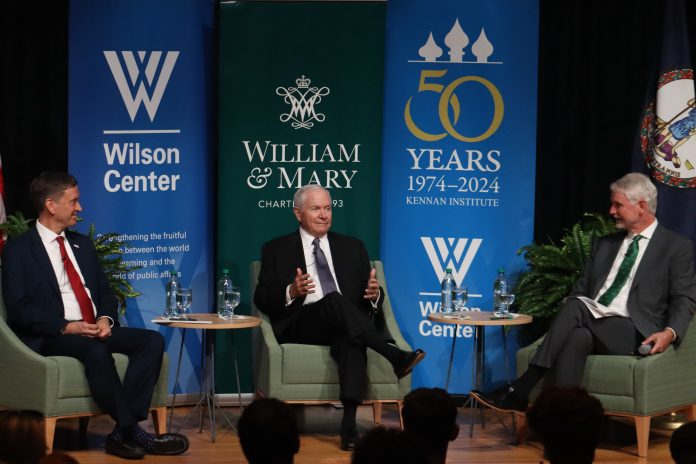Thursday, Oct. 17, the Global Research Institute welcomed Chancellor of the College of William and Mary Robert Gates ’65, L.H.D. ’98 and U.S. Ambassador Mark Green for a discussion on U.S. foreign policy.
Robert Gates served as the 22nd United States Secretary of Defense from 2006 to 2011, making him the only person to retain this position under presidents of different parties. In 2011, former President Barack Obama awarded him the Presidential Medal of Freedom.
Mark Green is president and CEO of the Wilson Center as well as a former administrator of the U.S. Agency for International Development. He also represented Wisconsin’s eighth district in the U.S. House of Representatives for four terms and served as the U.S. ambassador to Tanzania from 2007-2009.
George and Mary Hylton Professor of International Relations and GRI Director Mike Tierney moderated the event, which addressed critical international issues including U.S. relations with China and Russia, the conflict in Ukraine and the role of development aid in the Global South.
The discussion opened by evaluating George Kennan’s 1940s era containment strategy in the context of modern foreign policy. Gates emphasized that Kennan’s ideas remain partially relevant, but that the geopolitical landscape has changed dramatically.
He explained that what used to be in the periphery in Kennan’s time was now central, stressing that U.S. policy and military engagement must address multiple power centers, including China, Russia and the Middle East.
Green built on what the United States should prioritize with their non-military tools, criticizing the U.S.’s neglect of economic statecraft, particularly in Africa and other parts of the Global South.
“The Chinese foreign minister’s first trip each year is to Africa,” Green said. “If a cabinet secretary from the US goes to Africa it’s front page in the news. I don’t want it to be news. They want the kinds of economic opportunity that are at the heart of who we are and yet we are not paying nearly enough attention, and I think that’s crucial.”
Green and Gates agreed that the right strategy to approaching the Global South is active listening. Green explained that the United State’s most successful developmental programs have come from cooperation between partners as equals rather than forcing one country into a lesser role.
When the conversation shifted to the war in Ukraine, Gates warned that underestimating Russia’s ability to sustain the war would be a mistake. He pointed out that Russia has nine times the economy of Ukraine and three times the population, putting 30,000 new troops a month into Ukraine.
“People have significantly underestimated Russia and it probably has to do with not reading enough Russian history,” Gates said. “The Russians have historically performed badly at the beginning of virtually all their wars, regrouped, replaced their generals and eventually let Russian size and mass and territory be successful.”
Green, who recently visited Ukraine, praised the Ukrainian people for their adaptability amid the devastation, noting that students continued attending classes in subway stations despite the destruction of schools.
He emphasized that Ukrainians are not asking for U.S. troops, but for tools to defend their sovereignty and culture. However, he still worries about the sustainability of the U.S. aid flowing into Ukraine.
The conversation also explored U.S. policy in the Middle East, where both Gates and Green emphasized the need for continuity and strategic engagement.
Gates predicted that U.S. policy toward the region would remain largely consistent, regardless of who wins the 2024 election. He noted that both Democrats and Republicans share a strong commitment to supporting Israel and maintaining alliances with Gulf states.
Gates also talked about the Biden administration’s flaws in its current approach to Israel.
“The administration is way past due in dropping the hammer and saying if you don’t allow for X amount of humanitarian assistance into Gaza, our military assistance will stop,” Gates said.
Green highlighted the importance of long-term efforts to promote reconciliation and governance in conflict-affected areas like Gaza. He cited recent polling indicating that many residents in Gaza don’t support Hamas or the Palestinian Authority. Instead, they just want their day-to-day needs to be addressed, but feel like no one is listening to them.
The last 20 minutes of the discussion was reserved for students and other audience members to ask questions to Green and Gates.
Ridhima Gandhi ’28 appreciated the ability to interact with people like Gates and Green given their wide range of experiences and expertise.
“I went into the event knowing nothing and I thought it was interesting to learn more about Chancellor Gates,” Gandhi said. “Especially the part about visiting Putin and being there when something important was signed.”
Emma Beelner ’28 suggested areas of improvement for future talks.
“I honestly wish there was more student interaction,” Beelner said. “I think I would’ve gotten more out of it if it was more student-led, and I think it would’ve been a better way for Gates to interact with students as the current chancellor. But, I still thought it was really interesting and informative outside of that.”
Ashleigh Macphail ’28 admired how the panelists discussed both the missteps and triumphs of the U.S.’s foreign policy endeavors.
“I think these moments highlight how government, diplomacy and policymaking are not simple or straightforward,” Macphail said. “There are always going to be instances of successes and failures, and being able to recognize both situations makes a stronger government.”

